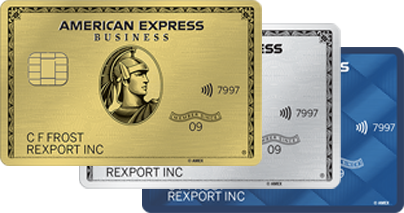Does a Corporate Credit Card Make Expense Management Easier?
By Elliot Kass | American Express® Freelance Contributor
5 Min Read | April 26, 2021
Summary
To help better manage their business expenses, a growing number of companies are giving their employees corporate credit cards.
As opposed to personal and other types of business cards, corporate credit cards are designed for companies to issue to their employees, who then use them to pay for authorized business expenses. These cards are typically geared towards mid-to-large size companies with annual revenue of at least $4 million and 15 or more employees who will make use of the card to charge a minimum of $250,000 per year. Also, as the name implies, corporate cards are generally reserved for companies that are registered as an S or C corporation.

While many corporate credit cards offer a variety of perks, such as frequent flyer miles and access to airport lounges, their chief advantage is that they make it much easier for both companies and employees to manage their business expenses.
Corporate Credit Cards Are Good for Employees…
Corporate credit cards allow employees to pay for their business expenses – such as an airplane ticket or a hotel room – without having to lay out cash or put the charges on their own credit cards. In many cases, the company is billed directly by the card issuer, so their employees don’t have to wait to get reimbursed and can cover their expenses without putting pressure on their personal cash flow. It also helps make it simpler for employees to track and document their expenses, freeing time for more important tasks.
And Even Better for Employers
For companies, requiring employees to charge their business expenses to a corporate card allows the organization to better help enforce limits on how much employees can spend – either on a particular type of transaction, such as a business meal, or over a specified period of time, such as a month, quarter, or fiscal year. A company can also restrict how the card can be used, confining its usage to certain locations or certain kinds of expenses. And since most of these cards support electronic expense reporting, employees can use their monthly statements to automatically populate their expense reports with the requisite purchase information. This makes it more likely that their reports will be accurate and completed on time, giving the company a better handle on its own cash flow.
How Corporate Credit Card Expense Management Benefits Businesses
Corporate credit cards help make it easier for companies to manage their expenses in other ways as well. Three in particular stand out:
- Centralized expense tracking. With a corporate credit card account, companies receive a single statement that includes the details for all employee expense transactions. Using the card’s automated expense reconciliation software – which is increasingly likely to make use of machine learning and other AI-related technologies – receipts can be automatically paired with transactions, helping to reduce the time spent by the accounting department reconciling expense reports.
- Less expense misuse. Inflating the number of miles driven on a business trip or submitting a receipt for a cab ride never taken are minor forms of employee misuse, but in aggregate they can add up quickly. The automated expense reconciliation available through a corporate credit card makes it possible to monitor expense outlays in real time and quickly spot irregular spending patterns. These are tipoffs that something may be amiss.
- Bigger discounts from suppliers. Vendors frequently offer discounts to businesses that pay for goods upon delivery, rather than waiting 30 to 60 days after receiving a shipment. Companies can lock in those savings by using a corporate credit card to set up automatic recurring payments to suppliers, where appropriate.
Getting the Most out of a Corporate Credit Card Program
To get the most out of a corporate credit card, it helps to follow a few best practices. For the most part, these are very straightforward and require little more than common sense:
- Discourage employees from putting personal expenses on their corporate cards. Instead, draw a clear distinction between what is an acceptable business expense and what is not. Because it’s possible for employees to inadvertently use the card for a personal item, business might want to opt for corporate cards with reconciliation software that can automatically distinguish between personal and business expenses.
- Only provide cards to employees who truly need them. There are risks associated with any credit card, and granting one to an employee should be regarded as a sign of trust. Not every employee needs a corporate card.
- To prevent excessive spending, set caps. Policies should be set for how much employees can spend on air tickets, hotel accommodations, and other types of expenses. These caps should be clearly communicated, and the corporate travel and expense (T&E) system should be configured to notify employees if a given expense exceeds those limits.
- To cut waste, monitor employees’ spending habits. One of the biggest advantages of a corporate credit card program is the visibility it provides into employee spending patterns. These can be analyzed for savings opportunities. Wasteful spending, bad habits, as well as outright fraud, can be quickly identified and addressed..

The Card your business deserves
From travel benefits to cash flow management, we've got a Card for you.






